"Written in
Dust"
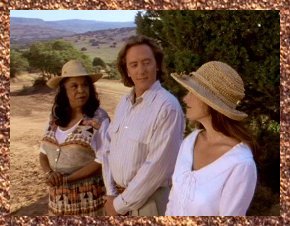
A review by Jenni:
Without planning to, I realize that I watched "Elijah" and "Written in
Dust" on Rosh Hashanah. That seems appropriate. I was
really struck by parallels in the two episodes so on this and the
"Elijah" page you'll see mentions of the other.
What I love about this
episode:
The
original reason I chose to watch this episode this evening was because
I'd been thinking about dust and ashes earlier. Yes, I know I'm
weird. I'll blame it on this being a vampire-friendly time of
year and both dust and ashes figuring into that mythology. A bit
later in the day I was thinking about my Grandpa. So despite
intending to watch "Secret Service," I felt pulled to this. It's
got dust right in the title and it's about a man and his grandpa.
The only thing that woulda made it better were if it was about a woman
and her grandpa but oh well. Anyhow, I just love the generational
struggles and triumphs as depicted here and in "Elijah." They
kinda seem like companion pieces.
One reason I like this episode is it gives me a lot to think
about. Like:
- How do I feel about differences of religion in marriage?
- What is the role of science in culture and religion? Is it okay
to disturb a grave so long as no one living cares?
- How does one forgive family members for hurt they've caused?
They're great questions, I think, and this episode raises them
all. It doesn't really answer any of them but like Monica says
late in the episode, at least if you're speaking then it's a
start. So just to get conversation going about these topics is a
good thing.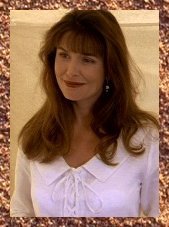
I really like Dillon's grandfather visiting him in his dreams. Of
course, I would have preferred it if, instead of Andrew describing him
as Dillon's memory, he would have been depicted as truly present.
In other words, I wish he'd been a spirit instead of a played back
memory. Nonetheless, I like the idea that our ancestors still
play a role in our lives, however people choose to conceptualize that.
I have a lot of appreciation for Monica's lines to Henry about how
something may be sacred to someone and not to someone else, with the
idea being that he (and by extension us) should respect that. I
think the world would be a lot nicer place if everyone embraced that
idea. There are a lot of things about religions I don't believe
or personally value, but I think we need to bring respect to them
anyway because to others they could mean everything.
On a goofier note, I get a kick outta Monica giving Tess a hard time
about not knowing the various functions of the buttons on the camera.
As "Elijah" did, this episode does an awesome job of showing parallels
between two cultures. Unfortunately, one of the biggest parallels
in this case (as Edison points out) is a shared history of
genocide. But the writers do a good job of also drawing parallels
in sayings, burial rites, concerns about the survival of the culture
and religion of a people, and the hope of survival through
children. Both this and "Elijah" present culture "clashes" but as
the episodes enfold we see less of clashing cultures and more of
cultures that compliment each other and share common bonds. It's
really astounding when you think about it. We all share so 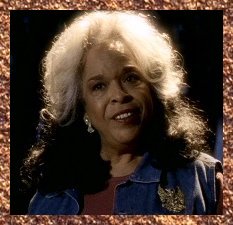 much
more than I think we realize!
much
more than I think we realize!
Tess
brings this parallel between "Elijah" and "Written" full circle
for me when she starts up with "Swing Low, Sweet Chariot." Both
this song and "Go Down, Moses" are African American Spirituals with
basis in the Hebrew Scriptures.
The instrumental music in this episode seems so much more dramatic to
me than in many other episodes. I really like it. It's very
elegiac.
I really love how this episode ends with the three angels praying one
after the other. It's just... lovely.
What I didn't love about this
episode:
Other
than wishing that Dillon's grandfather had been explained differently
and, of course, wishing Andrew was in this more I don't really have
much.
I suppose I do think it would have been more balanced to bring up
somewhere in the series that sometimes children have perfectly valid
and even morally right reasons to leave behind their childhood
religions. I don't think that was at all the case with Henry but
here and in "Elijah" we have characters that are made to regret that
falling away. But I do think we need to keep in mind that
sometimes people do have perfectly good reasons for abandoning their
original religion and even religion entirely. It's sad but not
altogether wrong.
Lingering questions:
Why
could Dillon see Andrew? I've always wondered what it is that
determines who can see the angels and when. Obviously Dillon
needed to eventually hear from Andrew and his grandfather's memory but
I don't entirely know why he kept seeing Andrew days before. What
was the purpose? That being said, I'm glad Dillon could see him
because then so could we!
Parts that made me feel
swoony:
First, if I ever have a mirage in a desert like Dillon thinks he has, I
hope it looks like Andrew!
So... any time Andrew's in a rather billowy, white shirt it's pretty
much dangerous. He looks wonderful!
It makes me feel sorry for Andrew and his fellow AODs when Tess says
"Angels of death have many jobs. Sometimes to bring us good news,
sometimes to bring us bad news." I dunno. I guess it just
made me wonder if the regular angels give much thought to how the AODs
feel about bringing bad news. And so then I wanted to coddle and
cuddle Andrew which is generally bad when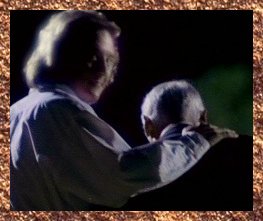 I'm trying to
seriously watch
an episode.
I'm trying to
seriously watch
an episode.
I really love the shot of Andrew walking into the moonlight with
Sam. This episode has a sentimental pull for me because we used a
handful of quotes from this episode when we made a scrapbook for my
Grandpa. He passed away 10 years ago and that scene of Andrew
walking away with Henry's chuckling grandfather, assuring him that
Heaven is beautiful is really comforting. It's stuff like that
which, I think, contributes to this teenage crush turning into
something that's lasted over a decade. It's hard to move on from
someone who has inspired you at really difficult times.
Random thoughts:
The no touching outside of marriage rule that Sam brings up must have
been really difficult. Course, I'm such a wacko that my thought
was "Aww... that must have been very hard for Andrew." I guess
cause earlier I'd mentioned on the JABB YG how much I think he thrives
on hugs and pats on the shoulder.
I think one reason I felt oddly pulled to this episode is because it
reminds me of something that happened while I was in college. I
was assigned a book about a massacre in South America. It was
native people slaughtered by the government. So a similar
scenario to what happens here. On the cover of the book was a
Grim Reaper chasing down a family. And seeing that, reading 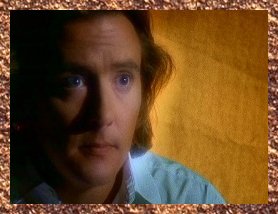 the
horrific account... I guess I lost my belief in angels of death.
I went around covering up photos of Andrew cause they just made me so
angry. I felt like I'd been lied to. How could anyone
witness that and survive unless there was something cold and dead in
their hearts? I eventually got pulled outta that, thank
God. Watching this episode tonight I thought back on that.
Seeing Andrew's determined yet distraught face as Dillon's grandfather
speaks about the massacre... I know that if angels of death exist (and
I believe they do) they go about their jobs with great courage, maybe
even self-abnegation and they definitely do not turn a cold, unfeeling
eye on anyone. And maybe their role is not only to comfort the
dying but also to bear witness to the atrocities that occur so the
victims don't have to.
the
horrific account... I guess I lost my belief in angels of death.
I went around covering up photos of Andrew cause they just made me so
angry. I felt like I'd been lied to. How could anyone
witness that and survive unless there was something cold and dead in
their hearts? I eventually got pulled outta that, thank
God. Watching this episode tonight I thought back on that.
Seeing Andrew's determined yet distraught face as Dillon's grandfather
speaks about the massacre... I know that if angels of death exist (and
I believe they do) they go about their jobs with great courage, maybe
even self-abnegation and they definitely do not turn a cold, unfeeling
eye on anyone. And maybe their role is not only to comfort the
dying but also to bear witness to the atrocities that occur so the
victims don't have to.
Finally, I wish there was a Catholic version of Kaddish. Maybe
there is and it's just not widely taught. Psalm 23 is nice, of
course, and Catholics share in that with the other People of the
Book. Still, I'm surprised there's not something more specific to
my religious group.
Back
to the Episode Guide
(The
photographs used on this
page are from "Touched by an Angel" and
owned by CBS Productions, Caroline Productions, and Moon Water
Productions. They are not being used to seek profit.)



 much
more than I think we realize!
much
more than I think we realize! I'm trying to
seriously watch
an episode.
I'm trying to
seriously watch
an episode. the
horrific account... I guess I lost my belief in angels of death.
I went around covering up photos of Andrew cause they just made me so
angry. I felt like I'd been lied to. How could anyone
witness that and survive unless there was something cold and dead in
their hearts? I eventually got pulled outta that, thank
God. Watching this episode tonight I thought back on that.
Seeing Andrew's determined yet distraught face as Dillon's grandfather
speaks about the massacre... I know that if angels of death exist (and
I believe they do) they go about their jobs with great courage, maybe
even self-abnegation and they definitely do not turn a cold, unfeeling
eye on anyone. And maybe their role is not only to comfort the
dying but also to bear witness to the atrocities that occur so the
victims don't have to.
the
horrific account... I guess I lost my belief in angels of death.
I went around covering up photos of Andrew cause they just made me so
angry. I felt like I'd been lied to. How could anyone
witness that and survive unless there was something cold and dead in
their hearts? I eventually got pulled outta that, thank
God. Watching this episode tonight I thought back on that.
Seeing Andrew's determined yet distraught face as Dillon's grandfather
speaks about the massacre... I know that if angels of death exist (and
I believe they do) they go about their jobs with great courage, maybe
even self-abnegation and they definitely do not turn a cold, unfeeling
eye on anyone. And maybe their role is not only to comfort the
dying but also to bear witness to the atrocities that occur so the
victims don't have to.